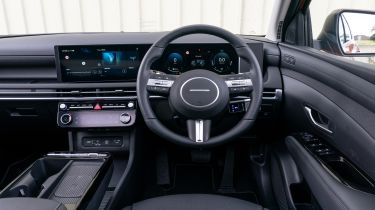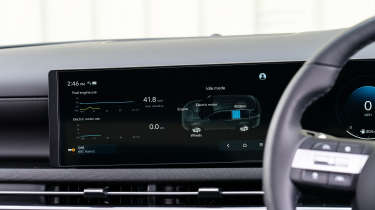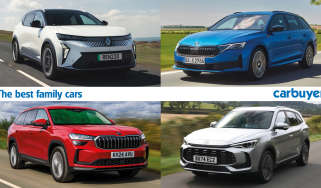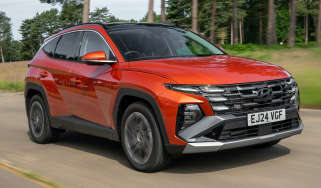Hyundai Tucson review - Interior & comfort
While Hyundai used to be a budget brand, its interior is now a real highlight
Pros
- Bold looks
- Smart interior
- Good to drive
Cons
- Price increase
- Slightly firm ride
- Boot size varies
Some of the biggest changes to the Tucson during its 2024 facelift have been to the interior. Its stylish new cabin design brings shades of the all-electric Ioniq 5 to the Tucson and Hyundai has done a sound job of mixing touchscreen controls and physical switches. When we put the Tucson head-to-head with the Ford Kuga and Vauxhall Grandland, the Hyundai had the finest finish of the three. There were some subtle exterior changes too, and new designs were added as part of the facelift, with 17-inch alloys for the entry-level Advance, 18-inch wheels for Premium trim, and 19-inch items in two different designs for N Line and Ultimate cars.
Hyundai Tucson dashboard
Since the facelift, the Tucson’s dashboard is simpler and sports a large panoramic display stretching from in front of the driver and to the centre, housing the driver’s display and infotainment screen. There are also subtler, thin air vents incorporated into a chrome strip that spans the entire dash for an elegant look, and as in other Hyundai models, the gear selector is on the steering column on all but the manual petrol model, which makes more space for storage on the centre console.
Interior build quality is still as impressive as it was before the facelift, and we like the fact that there are still a few physical switches and dials for climate controls, making them more intuitive to use than they would otherwise be had they been relegated to the infotainment screen. The 12.3-inch displays themselves showing the driver’s display and infotainment are crisp and clean with a simple easy-to-read layout. The infotainment screen even gets physical shortcut buttons below it that feel much more intuitive than the touch-sensitive ones from before. The touch response is quick enough, and loading a navigation route is fast, although Apple CarPlay and Android Auto – both available wirelessly here – remain our preferred choice for navigation and entertainment.
Equipment
The Tucson is now available in five trims comprising Advance, Premium, N Line, N Line S and the range-topping Ultimate. The equipment list feels generous as standard, with Advance cars getting features like 17-inch alloy wheels, dual-zone climate control, a reversing camera with front and rear parking sensors, cruise control, heated and electrically folding door mirrors, wireless Apple CarPlay and Android Auto and a wireless charging pad.
With everything Advance already boasts you might wonder what else comes on top in Premium. Go for this model and you get an electric tailgate, fancy Krell sound system, heated steering wheel, heated front and rear seats and an autonomous braking system which can stop you turning into oncoming traffic at a junction, as well as adaptive cruise control on all but the manual model.
For a sportier look, there are the N Line and N Line S models. These both get body-coloured cladding on the sides, rather than the dark black plastic of Advance and Premium models, and larger 19-inch wheels. Interior trim is also upgraded with suede and leather. N Line S adds a panoramic roof, 360-degree parking camera, ventilated front seats and matrix LED headlights.
Ultimate gets you all the bells and whistles of the N Line S, but forgoes the sportier look. There’s also leather upholstery and electrically adjustable front seats with a memory function. With everything the models get as standard, we’d stick to a lower trim, or otherwise spring for the N Line as the price gap between it and Premium isn’t particularly big, but you get the more attractive sporty styling.
Which Is Best?
Cheapest
- Name1.6T Advance 5dr
- Gearbox typeManual
- RRP£32,400
Most Economical
- Name1.6T Plug-in Hybrid Advance 5dr Auto
- Gearbox typeSemi-auto
- RRP£39,275
Fastest
- Name1.6T Plug-in Hybrid Advance 5dr Auto
- Gearbox typeSemi-auto
- RRP£39,275















